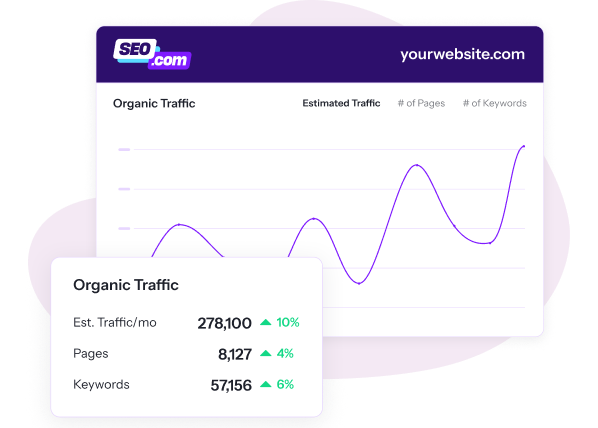What Is Dark Search and How Does It Affect You?
Unfortunately, one of the biggest challenges to SEOs in the past few years has been the loss of valuable data. When Google Analytics stopped providing important keyword data in 2012, it became much more difficult to understand what site visitors wanted.
Google still does not allow Analytics users to see the keywords their users type into search engines, and many SEOs refer to these data-limited queries as “dark search.” On this page, you’ll learn exactly what that means and how it affects your company’s strategy.
Sometimes it’s more helpful to speak with someone knowledgeable directly, rather than simply reading the information and trying to make sense of it all. Which is why you can contact us online or call 888-601-5359 today to speak with one of our experts!
What is dark search?
The term “dark search” refers to the limited data shown in Google Analytics regarding users’ search queries. Google hides these keywords to protect users’ privacy and instead shows “(not provided)” where the keywords would otherwise be in Google Analytics.
Google Analytics is the most widely-used analytics service on the Internet thanks to the wealth of data it provides to site owners. Some of the most valuable of this data relates to how visitors arrive on your site.
When you log in and navigate to Acquisition > All Traffic > Channels, you’ll see a list of all of the different ways visitors arrived on your site, like organic search, direct, referral, social, and email, among others.
The organic search row shows visitors who clicked on your site as a result of searches on search engines. If you click on it, you’ll then see those visitors broken down by the exact keywords that brought them to your site.
Prior to 2012, this report was extremely useful. Now, however, you’ll see the majority of your organic traffic lumped into a row with the keyword “(not provided).”

These searches come from users who are logged into one of Google’s services, like Gmail or Google+, so you can’t access any additional information. Google says that this is to protect the privacy of its users, but from an SEO perspective, the move represents a huge loss of information.
As a result, the term “dark search” was coined.
(Side note: This is not to be confused with dark traffic, which refers to a similar problem involving direct traffic attribution. It’s also not to be confused with the Dark Web, which refers to sites that hide the IP addresses of servers that run them. These means that they’re completely anonymous and often facilitate illegal activity. Dark search has nothing to do with illegal activity.)
How does dark search affect SEO?
Prior to dark search, looking at organic keywords was a great way to gain insight into your audience. You could analyze the words and phrases that were bringing visitors to your site and look for any trends among them.
If you noticed that a few keywords were particularly valuable, you could do additional keyword research for similar ideas. Then, you could create new pages for those ideas and optimize them as well.
As you continued to do this, it would give you an easy way to measure the success of individual keywords—and an easy way of improving.
Now that this information is no longer accessible, however, keyword research is a more difficult process, as is measuring the results of specific long tail keywords.
Partner with a team of ecommerce masters!
WebFX campaigns have delivered more than 14,936,451 ecommerce transactions in the last 5 years
Read the Case Studies

How can you optimize despite dark search?
Thankfully, it’s still entirely possible to be successful with SEO despite the challenges that dark search presents. Two of the best ways to do this are to look at organic traffic in terms of landing pages instead of keywords and to utilize the available data in Google Ads.
Landing pages
Using the same report as before, add “Landing Page” as your secondary dimension. Then, even though the keywords still display as “(not provided)”, you’ll be able to see which pages attracted your organic visitors first.
Although this doesn’t give you the exact keywords they searched, you can get an idea based on the keywords you used on each page. Then, you can identify patterns in audience interest, much like you would if you had direct access to the keywords themselves.
Google Ads
Does your company use Google Ads to run pay-per-click (PPC) ads? If so, you can use the data from your campaigns to improve your SEO strategy.
Analyze the individual keywords in your campaigns and see which ones have the highest numbers of impressions and clicks. Although this could potentially be affected by your budget and the competition for the individual keywords, it will at least give you a general idea of the interest level for each keyword.
Want to get started with your PPC campaign? Contact us online or call us today at 888-601-5359 to speak with a strategist about our PPC services!
Ready to improve your SEO strategy?
Creating an effective SEO strategy is a challenge, especially when there are limits on the data you can access. But at WebFX, we have years of experiencing researching and managing effective campaigns for our clients, and we want to do the same for you.
Contact us today to speak with a strategist about how our Internet marketing team can help you identify the keywords that are best suited to your audience and help you attract more potential customers.
Marketing Tips for Niche Industries
- Top-of-the-Line SEO Services for Health Insurance Companies
- Tourism SEO: 3 Tips for Getting Started
- Turn Online Searches into Sales with SEO for Flooring Companies
- Urgent Care SEO & SEO Services
- Why Long-Tail Keywords Are Important for Electricians
- Why SEO for Museums Matters
- Why Your Grocery Store Needs SEO
- Your Guide to Long Tail Keywords for Dentists
- Your Intro to Digital Marketing for Metal Fabricators

Optimize Your Website Faster with SEO.com
Effortlessly find opportunities and monitor performance with this user-friendly tool designed by the SEO experts at WebFX!
Try it for Free










